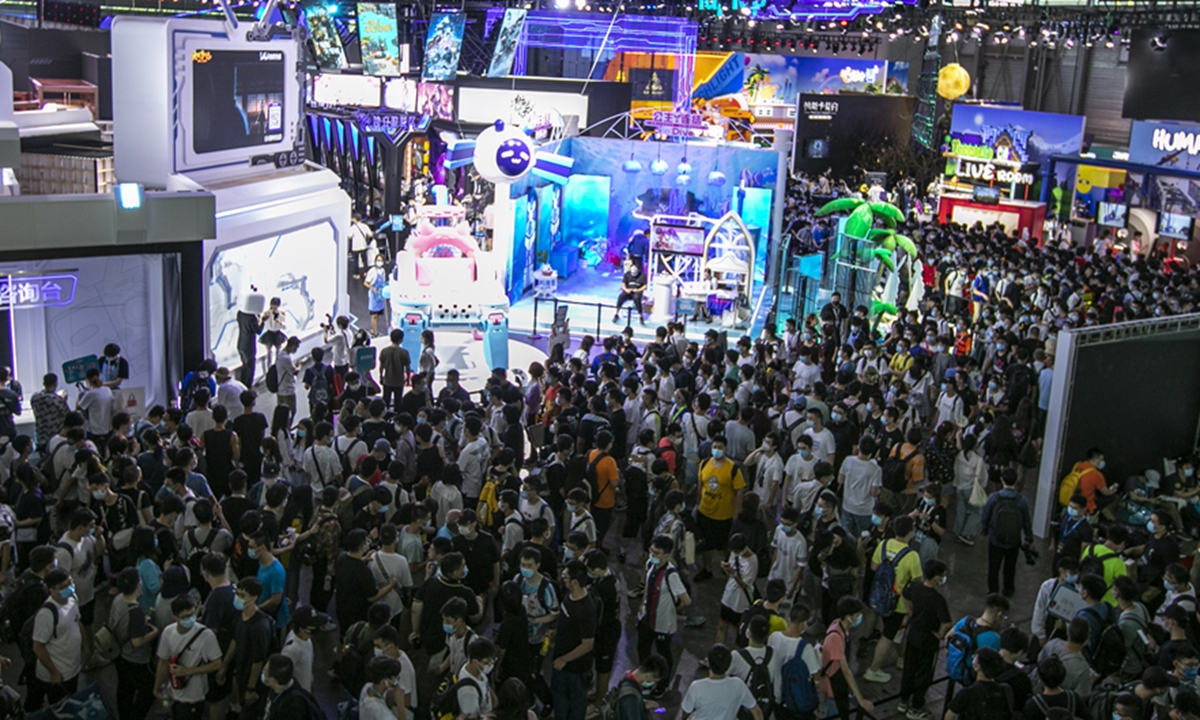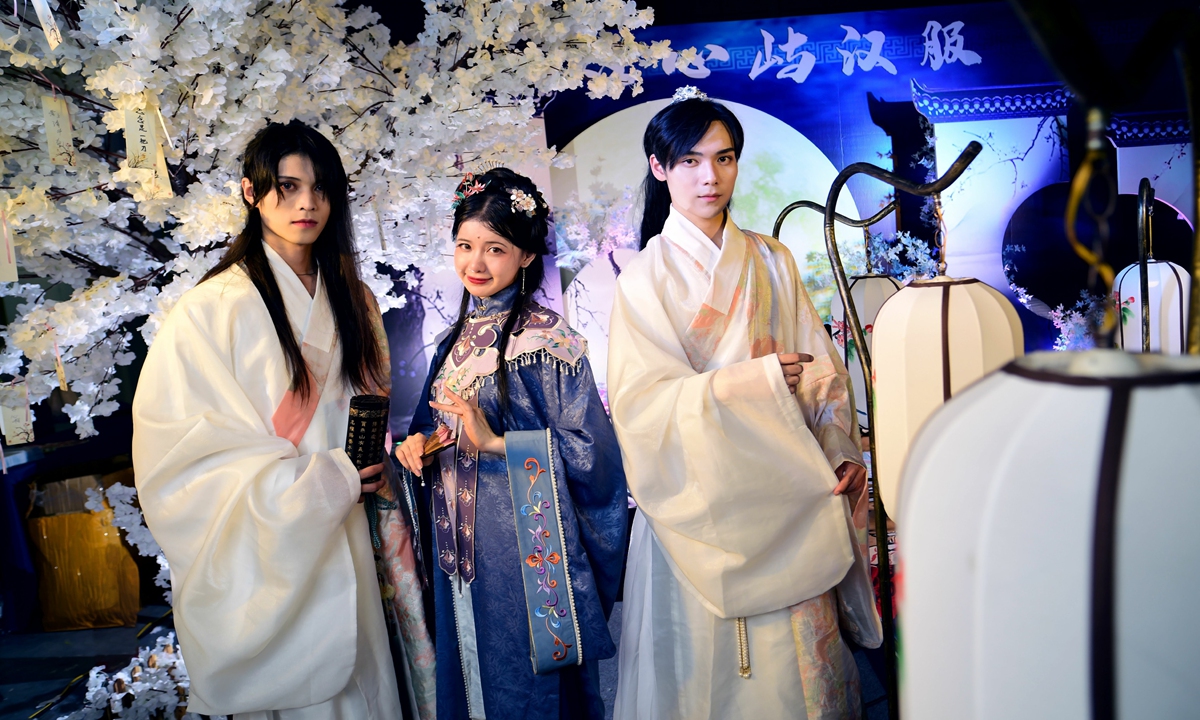IN-DEPTH / IN-DEPTH
China's Generation Z redefines trendy, shows growing confidence in local culture
China’s Generation Z redefines trendy, shows growing faith in local culture

Young people visit the Bilibili booth at ChinaJoy in Shanghai on August 1, 2020 Photo: IC
Twenty years ago, many young people in China who were first exposed to Western culture thought rebelling against traditional Chinese culture and mimicking foreign culture was fashionable and trendy. But this view is outdated for Generation Z today - a generation who grew up with China's rapid development - who now redefines what trendy is by promoting local culture while having an objective view of exotic cultural products.The new tastes of Generation Z are well represented on Bilibili, a website enjoying enormous popularity among China's youth with an estimated number of more than 100 million users. The website, which was originally the heaven for lovers of ACGN (Anime, Comics, Games and Novels), has now become a gathering place for internet-savvy young people.
The Nasdaq-traded Bilibili reached more than 190 million active monthly users in the third quarter 2020, according to its most recent financial report.
In the recent New Year's Eve gala presented by Bilibili on December 31, 2020, it attracted more than 100 million views within 48 hours with a colorful set of programs ranging from Peking Opera and classical Chinese animation to foreign songs.
The gala, for many audiences, showed that China's young people now have strong confidence and appreciation of their own culture.
"The young people of Generation Z, born after 1995, grew up amid the rapid development of China and under good economic conditions, which promotes their deep cultural confidence and cultural recognition, said Zhang Yiwu, a professor at Peking University.
"Growing up with the development of the Chinese internet industry, they have more access to diverse international information and culture which brings them a much broader vision and makes them more open and confident in analyzing foreign culture," Zhang said.
Love for tradition
About six years ago, Shang You, the director of China's 2020 hit anime White Cat Legend, never thought that his anime work would one day top the trending list on Bilibili.
To his surprise, once the anime was released, it soon became a hit and was rated favorably on review platform Douban, scoring 9.2 points of 10.
White Cat Legend is a 12-episode-long action-comedy anime that was released on Bilibili on April 10, 2020. It tells the story of an official attempting to solve crimes with the appearance of a white cat during the Tang Dynasty (618-907).
The interesting plot as well as the exquisite scenes in the anime have captured the hearts of many anime fans not only in China, but also in Japan, a country well-known for its anime production.
The number of Shang's followers increased from thousands at the beginning to about five million later.
Shang told the Global Times that he could feel the interest of young users of Bilibili has gradually shifted away from Japanese culture through Japanese anime to their own country's history with the availability of high-quality Chinese anime.
He said that Bilibili was only a niche cultural gathering place mainly based on Japanese ACG culture when he first registered in 2015. But now, the website has included more diverse content including dance, travel, dining, politics and college classes.
Different from most video websites, Bilibili promotes originality. Most videos its users upload are originally made, with videos introducing ancient classics with a modern touch often enjoying wide popularity.
In addition, the website promotes an interaction culture - danmu or bullet screen comments - where users exchange their opinions on the videos.
The Global Times reporter noticed that a growing number of Bilibili users are interested in the genre of international politics. They enthusiastically communicate and leave comments on these videos and their sense of recognition of China's development is vividly demonstrated.
They grew up in an era when China joined the WTO and became more open to the outside world. In addition to the wave of globalization, the internet has turned the earth into a "global village" with connectivity. Generation Z is indigenous to digital technology, and they can see the world and be seen by the world, Shi Wenxue, a cultural critic based in Beijing, told the Global Times.
Multicultural communication makes the environment more open, as Hollywood films, Japanese animation and ancient Chinese traditional culture are equally accessible and compete on the same stage, he said.
American YouTuber Nathan Rich, who runs "the King of Hotpot" channel and comments actively on politics and current affairs has registered on Bilibili.
"I like Bilibili because it has its own unique culture and the users are very real and sincere," said Rich. Currently, Rich has 1.32 million followers on Bilibili. Rich felt that the young generation in China are "becoming more aware of the political realities of the world, and that not everyone has positive intentions toward China."

Cosplayers dressed as figures from animations, comics, and games attend the Bilibili World 2020, an exhibition held by Chinese video-sharing website Bilibili, in Shanghai on August 7, 2020. Photo: IC
Growing cultural confidence
Zhang Hanyu is a PhD student in Atlanta, Georgia and a Bilibili veteran of six years. Her interests on the website cover many subjects - from deep learning courses to pranks, vlogs and beauty makeups.
"I love the bullet screen. It makes funny videos even funnier," Zhang said, adding that she is such a fan of the platform that she even bought Bilibili stocks.
Zhang also watches videos randomly showing traditional Chinese dress. "Although this is still a subculture group, such videos instill in our overseas Chinese some confidence in our culture."
Zhang said that she can often feel the confidence in being a Chinese today. "People from different countries around me all put expectations on China." She also said that she plans to work as a teacher to encourage the next generation of Chinese engineers, especially female engineers.
Zhao Shi, a Bilibili user since 2015, said that watching Bilibili is part of her daily routine and she loves the channels on food and life the most. She likes the advertisement-free videos on the website, as well as the rich array of films, TV and anime resources on it. She thinks Bilibili is multicultural and overall a fantastic platform.
Zhao, a university student in South China's Guangdong Province, said that she felt China's voice on the international stage has been growing increasingly louder thanks to the rise of its national strength and reputation. "I'd like to align my personal goals with the 'Chinese dream.' While embracing positive culture from other countries, I also want to introduce traditional Chinese culture to the world.
Professor Zhang Yiwu noted that the popular rock and punk culture pursued by the 70s and 80s generation is more of a rebellion against real life and local culture. As the earlier group of young Chinese people to have more contact with Western culture after the reform and opening-up, they looked up to the cultural differences between East and West, yearning for the possibility of a better life in developed countries.
Some people who were born in the 1970s grew up in a less affluent society and those born in the 1980s did not grow up in the internet age - they experienced the transformation of China going from poor to rich first-hand. This kind of longing and admiration of the West came from a lack of confidence, Zhang said.
However, the younger generation now has the confidence to look at Western culture with equal status. They believe that different lifestyles and values are the result of the different cultural and social development trends, not that China is backward in any way, he noted.
"This kind of cultural confidence will result in China being more active and creative in its development on the international stage in the future."

